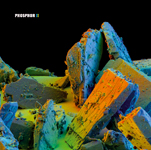|
|
 |
Dusted Reviews
Artist: Phosphor Album: Phosphor II Label: Potlatch Review date: Jul. 16, 2009 |

|
|
|
 |
Phosphor are Burkhard Beins on percussion, Axel Dörner on trumpet, Robin Hayward on tuba, Annette Krebs on guitar, Andrea Neumann on inside piano, Michael Renkel on guitars, and Ignaz Schick on turntables. If there’s ever an official history of improvised music since 1995, many of these names will appear prominently. In particular, Dörner and Hayward were key architects of the movement known as Berlin Reductionism, which introduced long silences, reduced volume and electronics into the world of improv. The interactions and cross fertilisations between Berlin Reductionism, New London Silence and Japanese onkyo were crucial to the development of electro-acoustic improvisation (eai) which grew up, centred on labels such as Erstwhile, For 4 Ears and Absinth. Beins has been its archetypal percussionist in groups such as Perlonex (with Schick), Activity Centre (with Renkel), the Sealed Knot, Trio Sowari, and his duo with Neumann.
The other members of Phosphor have played key roles as well, but enough with the history lesson. Phosphor II displays all the characteristics of classic eai. The volume is subdued and the music is punctuated by silences. There are few recognisable solo passages; much of the time the ensemble play together with individual sounds coming into the foreground and then subsiding again. All the players employ electronics in some form, and their sounds color the overall soundscape. Occasionally, particular instruments are recognizable, but more often they are treated, hence indistinguishable from the electronics.
Krebs mixed the vibrant opening track “P7,” Beins the next two, Renkel the next two, and Dörner the last “P12.” Their different approaches to mixing give the album a variety of sound and texture. So “P9,” mixed by Beins, gradually builds to a climax that is surprisingly rhythmic by eai standards. The two tracks mixed by Renkel are protracted and mellow, slowly unfolding. “P12,” mixed by Dörner, is episodic with plenty of silence.
Given the array of players producing it, the most distinctive feature of Phosphor’s music is its absence of competing egos. The empathy of the players and the communication between them is impressive. No one player dominates, and they never get in each other’s way. They all time their responses well, with no obvious pressure to respond. When silence is appropriate, it happens.
By John Eyles
|







